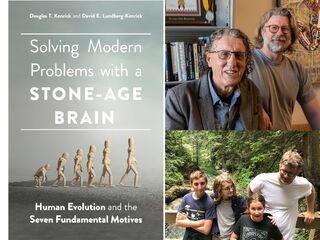How To Survive The Modern World

Source: Encompass of book reviewed hither, authors (photo by Rob Ewing), and authors' children (photo by Doug Kenrick), all used with permission
If a family unit from a traditional hunter-gatherer society were transported into the modern urban globe, they would recollect they'd landed in paradise: Self-driving cars, manus-held electronic devices that can prevent you from getting lost and even direct you to a nearby supermarket stocked with colorful, fresh blueberries, strawberries, and bananas, homes with air workout and plush mattresses, and refrigerators to store all that produce from the supermarket. Wow. Not to mention the power to call in an order of fresh-baked pizza and some double-chocolate-fudge ice foam for dessert.
The hunter-gatherers would probably be balked to acquire that people living amidst all of these luxuries are often miserably depressed and broken-hearted. What'south incorrect with us?
In a volume released this week, Solving Modernistic Problems With a Stone-Age Brain: Human being Evolution and the Seven Cardinal Motives, my son Dave Lundberg-Kenrick and I try to respond this question. Nosotros employ our renovated pyramid of man needs equally a framework to compare mod humans with our ancestors in terms of addressing six primal goals:
- Surviving
- Protecting ourselves from the bad guys
- Making friends
- Finding mates
- Keeping those mates
- Taking intendance of our families
Ironically, the powerful evolved motivations that helped our ancestors achieve those goals are often miscalibrated in the electric current world. Worse, those powerful motivational systems oftentimes open u.s.a. up to beingness parasitized by modern technology.
In the book, we also tap research from mod psychology to suggest how to reach these central human goals in more than effective and fulfilling ways and to avert what we call "robo-parasites"—technological advancements that prey upon our previously adaptive motivations.
Dave, who has a groundwork in both picture show product and psychology, is the Media Outreach Program Manager for ASU's Psych for Life program, for which he films psychological experts addressing the question of how research can inform usa about living more fulfilling lives.
The two of the states accept spent many hours walking and biking around, pondering the question of how that inquiry could help u.s.a. raise his younger brother and his own son and daughter.
To write the book, nosotros delved not only into research on evolutionary and positive psychology simply also into anthropological findings almost life in traditional, small societies. It was eye-opening learning a bit about the everyday lives of the !Kung, the Maisin, the Ya̧nomamö, the Kapauku Papuans, and the Aché, and comparing their lives to ours.
In each chapter, we open up with a case case of someone with a peculiarly modernistic problem, such as Walter Hudson, who reached 1,197 pounds and was unable to leave his bedroom for over a decade, or William Bulger, a university president who faced the question of whether to aid the regime capture his brother Whitey, who was on the FBI's 10 Almost Wanted list. We then take a wait at the evidence most how people in minor-calibration societies handled similar bug of survival or family unit relationships, for case, and how their problems differed from the problems we confront today. We and then review evidence to suggest a few solutions to these recurrent problems.
One of the issues that come up repeatedly in the book is the naturalistic fallacy—or the thought that what is natural = what is skillful. This has led to a misconception that evolutionary psychology advocates living the life of someone like Genghis Khan—doing whatever it takes to have every bit much equally possible for yourself and spread your genes widely. We argue that life would be more fulfilling if we took as our role model a woman named Osceola McCarty. Osceola was an African American adult female born in Mississippi in 1908 who dropped out of school in the sixth grade to help a ill aunt. She never returned to her education but instead washed other peopleʼs dress up till the age of 87. Although she did non make a lot of money, she had few expenses and accumulated the equivalent of half-meg dollars.
When her banker asked how she wanted to invest the money, she replied that she wanted to give it abroad. She did, setting upward a fund for African American girls to go to college. Osceola loved her humble life, and she was loved by others. She succeeded by post-obit a elementary formula that many of our esteemed colleagues, some experts on positive psychology, suggested for living a fulfilling life: "Exist kind to others."
One nice thing nearly writing is that it forces you to learn. As nosotros wrote this book, nosotros learned a lot nearly anthropology, positive psychology, and why we ourselves often discover modern life daunting. Now, if we can merely become Dave's younger brother and his son and daughter off their wonderfully captivating modern technological devices to read the book…
Source: https://www.psychologytoday.com/intl/blog/sex-murder-and-the-meaning-life/202205/how-survive-the-modern-world-stone-age-brain

0 Response to "How To Survive The Modern World"
Post a Comment